AN IDENTITY QUEST COMES UP EMPTY
As the cops say, “Nothing to see here, folks. Move right along.” Or, as Gertrude Stein said of Oakland, there is no “there there.” Both cautions apply to Goodman Theatre’s wrongly commissioned world premiere King of the Yees. (produced in association with Los Angeles’s Center Theatre Group; the play opens at the Kirk Douglas Theatre July 9). This is purportedly playwright Lauren Yee’s quest for identity as a Chinese-American exploring San Francisco’s Chinatown. But her alternately boring or boisterous 140-minute two-act delivers unrevealing revelations so generic they must be camouflaged by Joshua Kahan Brody’s frenetic and incoherent staging. A poor man’s Flower Drum Song, Yee’s efforts to bridge both generational and cultural gaps take two hours to go nowhere.
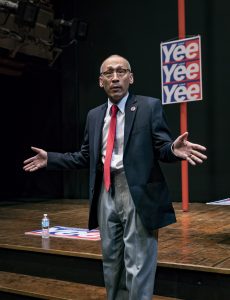 Irritatingly playful, phonily presentational, and very personally indulgent, King of the Yees contrasts two generations at cross-purposes: the playwright’”whose surrogate character turned her back on her heritage, intends to move to Berlin, and doesn’t want kids’”with her imbecilically cheerful dad Larry (the title role), a banal booster.
Irritatingly playful, phonily presentational, and very personally indulgent, King of the Yees contrasts two generations at cross-purposes: the playwright’”whose surrogate character turned her back on her heritage, intends to move to Berlin, and doesn’t want kids’”with her imbecilically cheerful dad Larry (the title role), a banal booster.
No longer dutifully diligent, the 30-year-old daughter declares that her play is about “how things fall apart and how to say goodbye.” (She will take back this admission by the empty end.) She doesn’t understand the ethnic pride of her 60-year-old father (the irritatingly bumptious Francis Jue) at being head of the Yee Fung Toy family association, “an obsolescent men’s club dedicated to the preservation of the Yee line.” She also rejects her patriarch’s ancestor worship, minority activism, male smugness, and obsession with putting family over all.
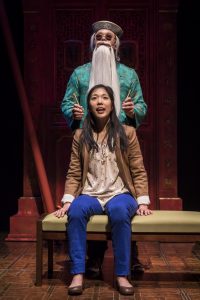 Larry’s suddenly scandalous connection with a corrupt politician, who he smarmily thinks will advance the Yee interests, further alienates the daughter. It also triggers Larry’s seemingly fateful disappearance. (This turns out to be a complete red herring.) So, pushing through a ceremonial portal, Lauren (yes, her character is herself) embarks on a stereotype-ridden journey into Chinatown to find Larry.
Larry’s suddenly scandalous connection with a corrupt politician, who he smarmily thinks will advance the Yee interests, further alienates the daughter. It also triggers Larry’s seemingly fateful disappearance. (This turns out to be a complete red herring.) So, pushing through a ceremonial portal, Lauren (yes, her character is herself) embarks on a stereotype-ridden journey into Chinatown to find Larry.
Along the way, Lauren (Stephenie Soohyun Park) encounters a host of blatant Chinese clichés: a disco-crazed Fu lion; garrulous elders demanding a “buy” to retrieve her dad; a “Tong” gangster named Shrimp Boy; a gratuitously violent F.B.I. 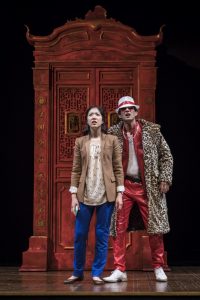 shootout; a “face-changing” entertainer; a chiropractor/acupuncturist/
shootout; a “face-changing” entertainer; a chiropractor/acupuncturist/
All this time her father is ridiculously rampaging around the Mission district, tearing down posters of his disgraced candidate on Geary and 19th streets. Lauren’s manic journey of discovery was, it seems, theatrical and thematically sterile. Chinatown’s contemporary problems’”elder abuse, the disappearance of SROs, “paper names” that disguise real origins, skyrocketing rents and gentrification, and the persecution of undocumented restaurant workers’”are introduced by a planted protester, then dismissed. (Strangely, there are also curious allusions to Jewish-Americans that might just be offensive if they made more sense.)
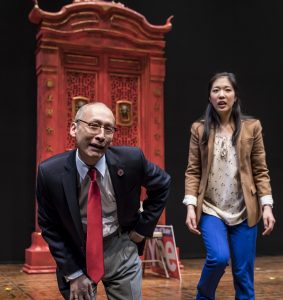 Yee varies the (in)action with pointless scenes between two Asian-American actors playing the roles in play and making obvious observations about white discrimination and their ethnic exploitation. Vainly pretending something’s at stake here, Mike Tutaj’s frantic projections punctuate the action.
Yee varies the (in)action with pointless scenes between two Asian-American actors playing the roles in play and making obvious observations about white discrimination and their ethnic exploitation. Vainly pretending something’s at stake here, Mike Tutaj’s frantic projections punctuate the action.
At play’s end, Lauren discovers what the audience doesn’t’”that her dad has something to offer. (That turns out to be an empty anecdote about his dad confessing his fear of being forgotten and of forgetting due to senility.) We’re to believe this breakthrough disclosure will work a reconciliation between Larry and Lauren. The play, we’re now told, is about beginnings, not saying goodbye. Except, given what little we learn, it’s not. It’s about Lauren Yee.
Rammel Chan, Angela Lin and Daniel Smith play assorted Asian-American caricatures of the Fu Manchu/Charlie Chan persuasion. Like everything on this stage, they are far more annoying than amusing.
With its in-jokes, private gossip, cute contrivances, and closed references, King of the Yees, at worst and at most, is Yee’s self-referential, narcissistically conceived concoction, a family album whose snapshots mean next to nothing. Lauren Yee is the once and future audience of King of the Yees. We needn’t bother.
photos by Liz Lauren
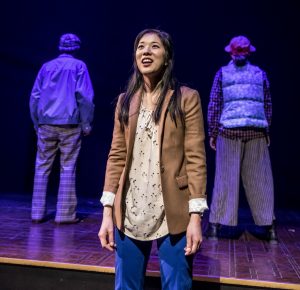 King of the Yees
King of the Yees
Goodman Theatre (co-production
with Center Theatre Group)
Owen Theatre, 170 North Dearborn
ends on April 30, 2017
for tickets, call 312.443.3800
or visit Goodman
then plays the Kirk Douglas Theatre
9820 Washington Blvd
in Culver City (Los Angeles)
ends on August 6, 2017
for tickets, call 213.628.2772
or visit CTG
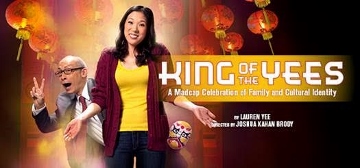
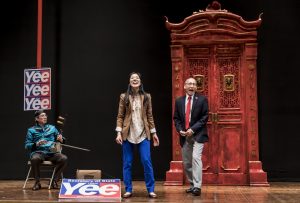
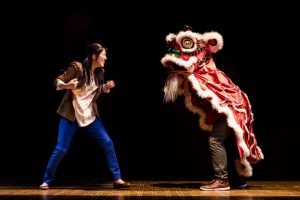
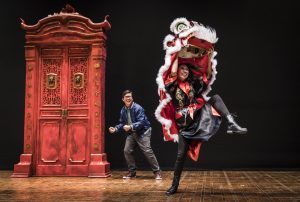

{ 10 comments… read them below or add one }
Harsh! Very harsh! I thought the play was touching and endearing. We enjoyed it.
Hmmm… I agree with Linda. That’s not the experience I had at all. The crowd was literally laughing from beginning to end, and finished with a standing ovation from everyone in the theater. To me the play was very innovative and pulls you out of the directors seat within the first five minutes, which I personally love. Maybe you were in the wrong theater??? Definitely an unfair review, and seems a little personal…
The review is misguided and mean. This is certainly not a perfect show and the young playwright can be self-indulgent at times. But King of the Yees works harder than James Brown to entertain the audience, contains about a thousand laughs, and is at times touching and thought provoking. I recommend you go see it.
I just saw this in L.A. and I wish I had read this review beforehand; I thought this critic was accurate. As a Chinese American I cringed throughout the Asian jokes and at the caricatures being presented in this play. It did not feel authentic. Jokes were forced, and very few in the theater laughed despite the actors’ desperate attempts to make it work. Way more Margaret Cho’s American Girl than Fresh Off the Boat.
Two-word review: Dramaturgical mess.
Glad for the agreement from some readers. As for the praise from other worthy correspondents, well, I can’t argue with laughter. But I can object to the price you pay for finding funny a trivializing mockery of many Asian-Americans’ genuine, un-gimmicky, and un-clichéd search for identity.
Okay Mr. Bommer, I’m assuming you’re not an Asian American. I hate when white people come out and say this is what Asian Americans are going through, and look at their plight as if you know what we go through, and championing us makes you awake or an elevated human. Sit down.
We Asian Americans can explore our heritage through every and ANY channel, whether it’s through mockery, comedy, humor, or heavy drama. All you tight-asses need to loosen up! In the scene where they are mocking Chinese accents, it’s a comment of the fact that Asian-American actors are constantly asked by the white directors and producers of the world to audition for roles WITH accents, even though they’ve been born in the country and have no clue what China is like. They were making fun of how, even after several generations of being in America, white America still doesn’t see us as Americans, and constantly ask us to be more “Asian”, more like the motherland… And it was reclaiming all the yellowface this country has blanketed us with in the past, and STILL TO THIS DAY blankets us with!!
This reminds me of the time when fellow Chicagoan, Roger Ebert, told an audience member to sit down when the guy criticized the makers of “Better Luck Tomorrow” for making a movie that shows Chinese Americans in such an unflattering, “amoral” light. Roger Ebert said: “What I find very condescending and disturbing about your statement is nobody would say to a bunch of white filmmakers, ‘How could you do this to your people?!’ Yes, film has the right to be about these people and Asian American characters have the right to be whoever the hell they want to be. They do not have to represent their people.”
So to you, Mr. White Man, who wants to dictate to us how we must tell our story…. SIT DOWN. And to the Asian folks that got offended by this… I’m gonna guess you were made fun of a bunch for being Asian when you were a kid, so all these jokes touched a nerve. But if you find your way out of your obvious insecurities of being Asian in America, you’ll find yourself enjoying this play.
To understand why Chinese Americans are different from other immigrant groups, one has to examine the effects of the Chinese Exclusion Act.
I saw this play in Los Angeles. Excellent performances. There were more Jewish people in the audience than Asians.
I just saw the play at the Kirk Douglas in L.A. As a Chinese-American who speaks fluent Cantonese, the actors’ attempt at speaking Cantonese was absolutely atrocious! However, the major flaw of King of the Yees lies in the script itself — unfocused and lackluster. I don’t mind seeing plays of any subject so long as it is quality writing, well directed/acted. Based on the numerous plays and musicals I’ve seen over the past 25 years, many of the Asian and Hispanic playwrights still lack quality. Yet, they continue to get produced due to grants and funding. And in a world where everything needs to be politically correct, theater critics censor themselves from giving ethnic plays a negative review, so I applaud Mr. Bommer.
My dismay at the ascendance, temporarily, I hope, of the “paranoid strain†in American politics, with its mindless attacks on media and intellectuals, constrain my description of how off I found this review. I can only hope Mr. Bommer is himself a little taken aback by being praised for his “courage†in recognizing the inferior writing abilities of “ethnic playwrights.â€
I loved this play. Lauren Yee’s exploration of stereotypes, both in and without the Chinese and immigrant community, was satiric and humane, without a hint of demeaning anyone. And whether the praise is most due Yee, or actors Angela Lin and Daniel Smith, the scene in which Smith instructs Lin, a Korean, in how to construct Hollywood’s version of a Chinese accent, was one of the most powerful scenes I have ever experienced in the theater. I was educated and charmed.
Yee’s message, that Bommer appears to dismiss as “unrevealing†and “generic,†is, I believe, the need to construct a narrative connecting with one’s past in order to give meaning—find one’s place—in the world. It may begin, and end, with immediate family. But the exploration of myth, whether the Ancient Ancestor, or a snippet of Miss Saigon, mistakenly identified with one’s mother (historical accuracy is irrelevant here) is necessary so that, per T.S. Eliot, one can know it for the first time.
I was captured by the suspense of the threatened loss of the connection between father and daughter, and was in tears at the conclusion. I should confess my bias. I am a father of a daughter and as she has learned, as I get older, I tend to cry at the drop of a hat. The play, near the end, is certainly sentimental. To me, however, the playwright’s courage—not self-indulgence—in writing herself into the play established the sincerity of the sentiment, removing any hint of manipulation.
Mr. Bommer’s contrary views regarding the merits of the play deserve respect. To the extent that his review suggests that the audience was bored, annoyed, and unmoved, however, he must have seen the play in another universe. In the Kirk Douglas Theater last night the audience was visibly entertained throughout and spontaneously stood to applaud at the end.
I believe the play is at the end of its run this week, but was so entertained that I felt an obligation to the production to respond to Mr. Bommer’s review.